Organisational Behaviour Report: 4com plc, Motivation and Teams
VerifiedAdded on 2020/12/09
|16
|5407
|442
Report
AI Summary
This report examines organisational behaviour within the context of 4com plc, a UK-based telecommunications company. It explores the influence of organisational culture, power dynamics, and political behaviour on individual and team performance. The report delves into various types of power, including coercive, reward, legitimate, referent, expert, and informational power, and their impact on employee behaviour. It also analyses the characteristics of organisational politics and how they affect workplace dynamics. Furthermore, the report evaluates content and process theories of motivation, including Maslow's hierarchy of needs, and discusses motivational techniques such as intrinsic and extrinsic motivation. The report also addresses the components of an effective team. The report provides recommendations for managers at 4com plc to foster a positive work environment and enhance employee performance.
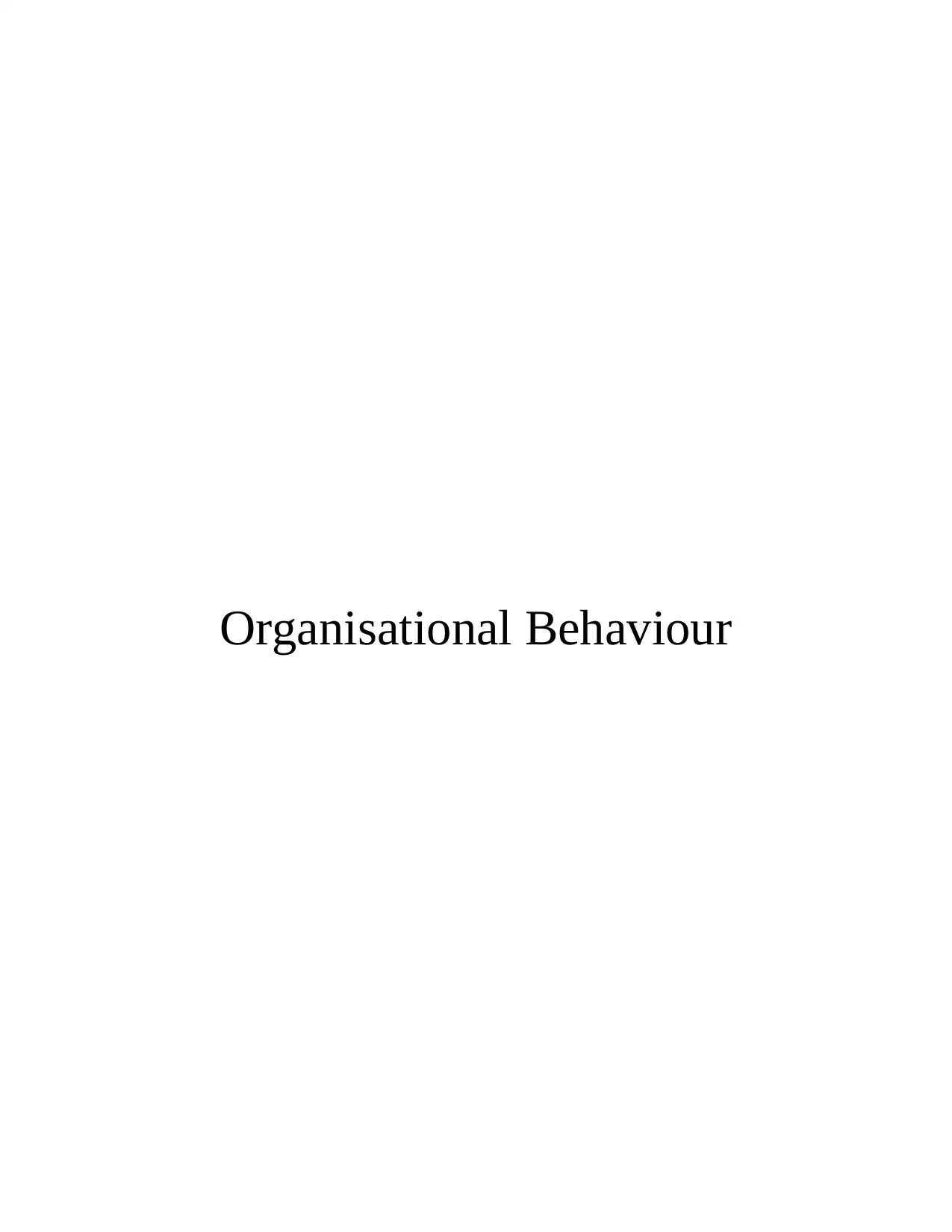
Organisational Behaviour
Paraphrase This Document
Need a fresh take? Get an instant paraphrase of this document with our AI Paraphraser
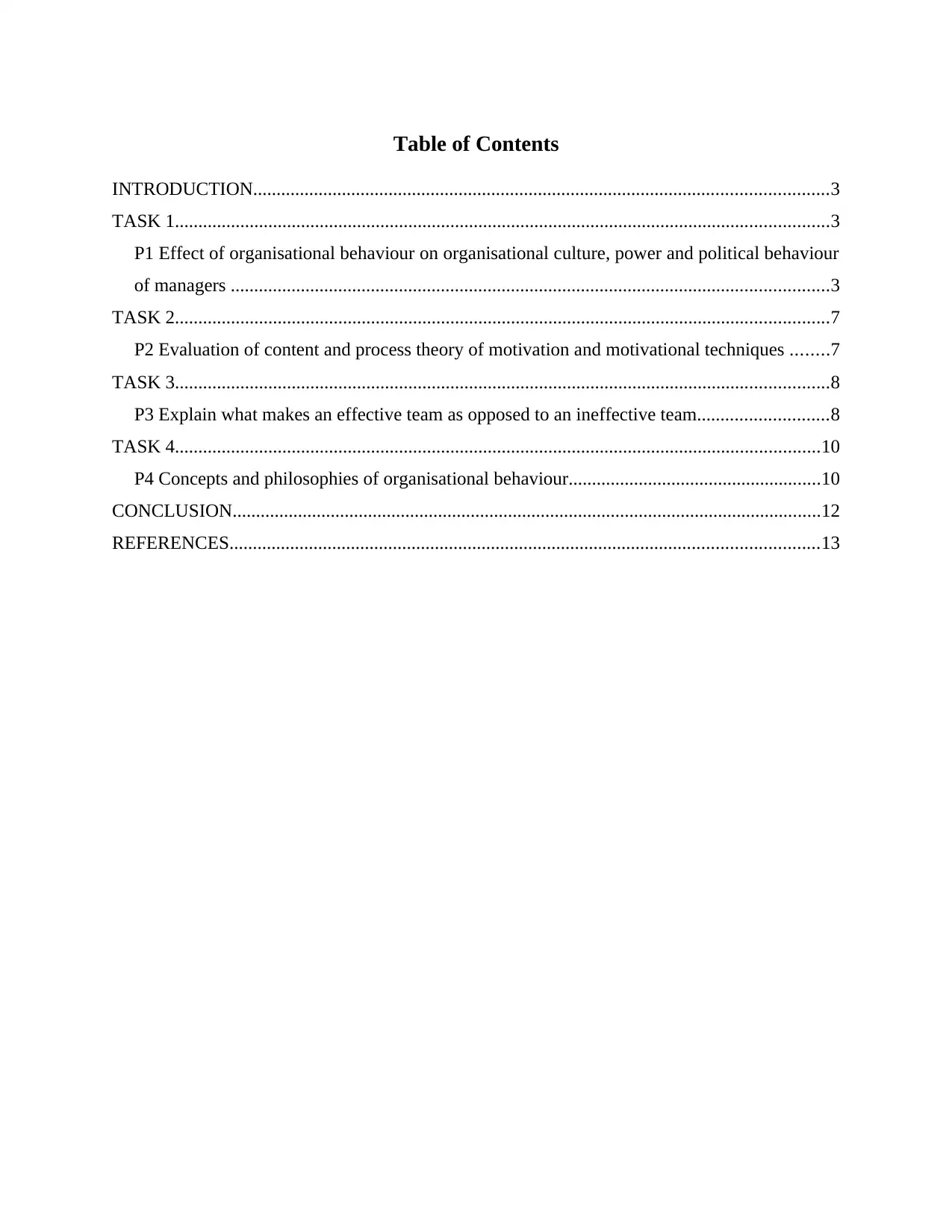
Table of Contents
INTRODUCTION...........................................................................................................................3
TASK 1............................................................................................................................................3
P1 Effect of organisational behaviour on organisational culture, power and political behaviour
of managers ................................................................................................................................3
TASK 2............................................................................................................................................7
P2 Evaluation of content and process theory of motivation and motivational techniques ........7
TASK 3............................................................................................................................................8
P3 Explain what makes an effective team as opposed to an ineffective team............................8
TASK 4..........................................................................................................................................10
P4 Concepts and philosophies of organisational behaviour......................................................10
CONCLUSION..............................................................................................................................12
REFERENCES..............................................................................................................................13
INTRODUCTION...........................................................................................................................3
TASK 1............................................................................................................................................3
P1 Effect of organisational behaviour on organisational culture, power and political behaviour
of managers ................................................................................................................................3
TASK 2............................................................................................................................................7
P2 Evaluation of content and process theory of motivation and motivational techniques ........7
TASK 3............................................................................................................................................8
P3 Explain what makes an effective team as opposed to an ineffective team............................8
TASK 4..........................................................................................................................................10
P4 Concepts and philosophies of organisational behaviour......................................................10
CONCLUSION..............................................................................................................................12
REFERENCES..............................................................................................................................13
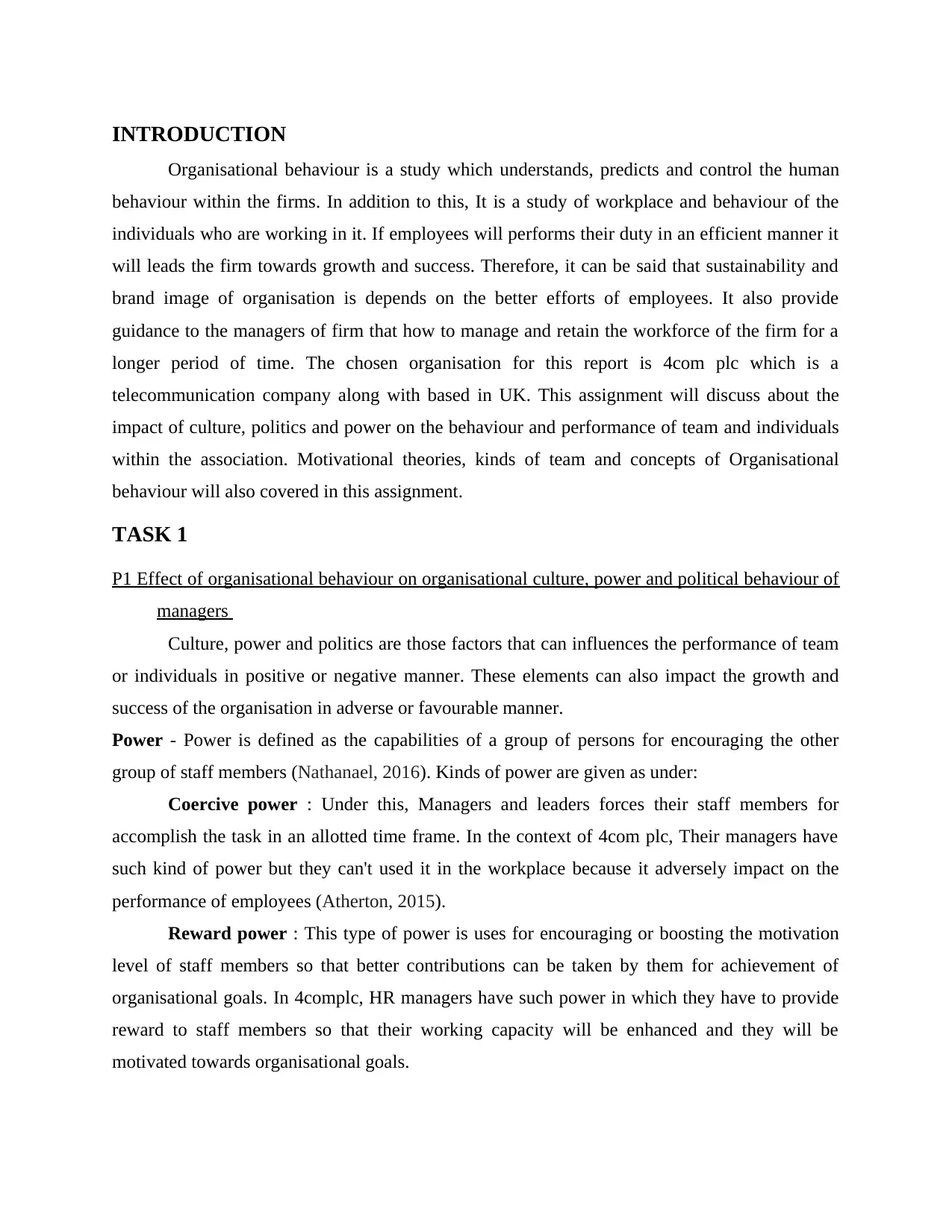
INTRODUCTION
Organisational behaviour is a study which understands, predicts and control the human
behaviour within the firms. In addition to this, It is a study of workplace and behaviour of the
individuals who are working in it. If employees will performs their duty in an efficient manner it
will leads the firm towards growth and success. Therefore, it can be said that sustainability and
brand image of organisation is depends on the better efforts of employees. It also provide
guidance to the managers of firm that how to manage and retain the workforce of the firm for a
longer period of time. The chosen organisation for this report is 4com plc which is a
telecommunication company along with based in UK. This assignment will discuss about the
impact of culture, politics and power on the behaviour and performance of team and individuals
within the association. Motivational theories, kinds of team and concepts of Organisational
behaviour will also covered in this assignment.
TASK 1
P1 Effect of organisational behaviour on organisational culture, power and political behaviour of
managers
Culture, power and politics are those factors that can influences the performance of team
or individuals in positive or negative manner. These elements can also impact the growth and
success of the organisation in adverse or favourable manner.
Power - Power is defined as the capabilities of a group of persons for encouraging the other
group of staff members (Nathanael, 2016). Kinds of power are given as under:
Coercive power : Under this, Managers and leaders forces their staff members for
accomplish the task in an allotted time frame. In the context of 4com plc, Their managers have
such kind of power but they can't used it in the workplace because it adversely impact on the
performance of employees (Atherton, 2015).
Reward power : This type of power is uses for encouraging or boosting the motivation
level of staff members so that better contributions can be taken by them for achievement of
organisational goals. In 4complc, HR managers have such power in which they have to provide
reward to staff members so that their working capacity will be enhanced and they will be
motivated towards organisational goals.
Organisational behaviour is a study which understands, predicts and control the human
behaviour within the firms. In addition to this, It is a study of workplace and behaviour of the
individuals who are working in it. If employees will performs their duty in an efficient manner it
will leads the firm towards growth and success. Therefore, it can be said that sustainability and
brand image of organisation is depends on the better efforts of employees. It also provide
guidance to the managers of firm that how to manage and retain the workforce of the firm for a
longer period of time. The chosen organisation for this report is 4com plc which is a
telecommunication company along with based in UK. This assignment will discuss about the
impact of culture, politics and power on the behaviour and performance of team and individuals
within the association. Motivational theories, kinds of team and concepts of Organisational
behaviour will also covered in this assignment.
TASK 1
P1 Effect of organisational behaviour on organisational culture, power and political behaviour of
managers
Culture, power and politics are those factors that can influences the performance of team
or individuals in positive or negative manner. These elements can also impact the growth and
success of the organisation in adverse or favourable manner.
Power - Power is defined as the capabilities of a group of persons for encouraging the other
group of staff members (Nathanael, 2016). Kinds of power are given as under:
Coercive power : Under this, Managers and leaders forces their staff members for
accomplish the task in an allotted time frame. In the context of 4com plc, Their managers have
such kind of power but they can't used it in the workplace because it adversely impact on the
performance of employees (Atherton, 2015).
Reward power : This type of power is uses for encouraging or boosting the motivation
level of staff members so that better contributions can be taken by them for achievement of
organisational goals. In 4complc, HR managers have such power in which they have to provide
reward to staff members so that their working capacity will be enhanced and they will be
motivated towards organisational goals.
⊘ This is a preview!⊘
Do you want full access?
Subscribe today to unlock all pages.

Trusted by 1+ million students worldwide
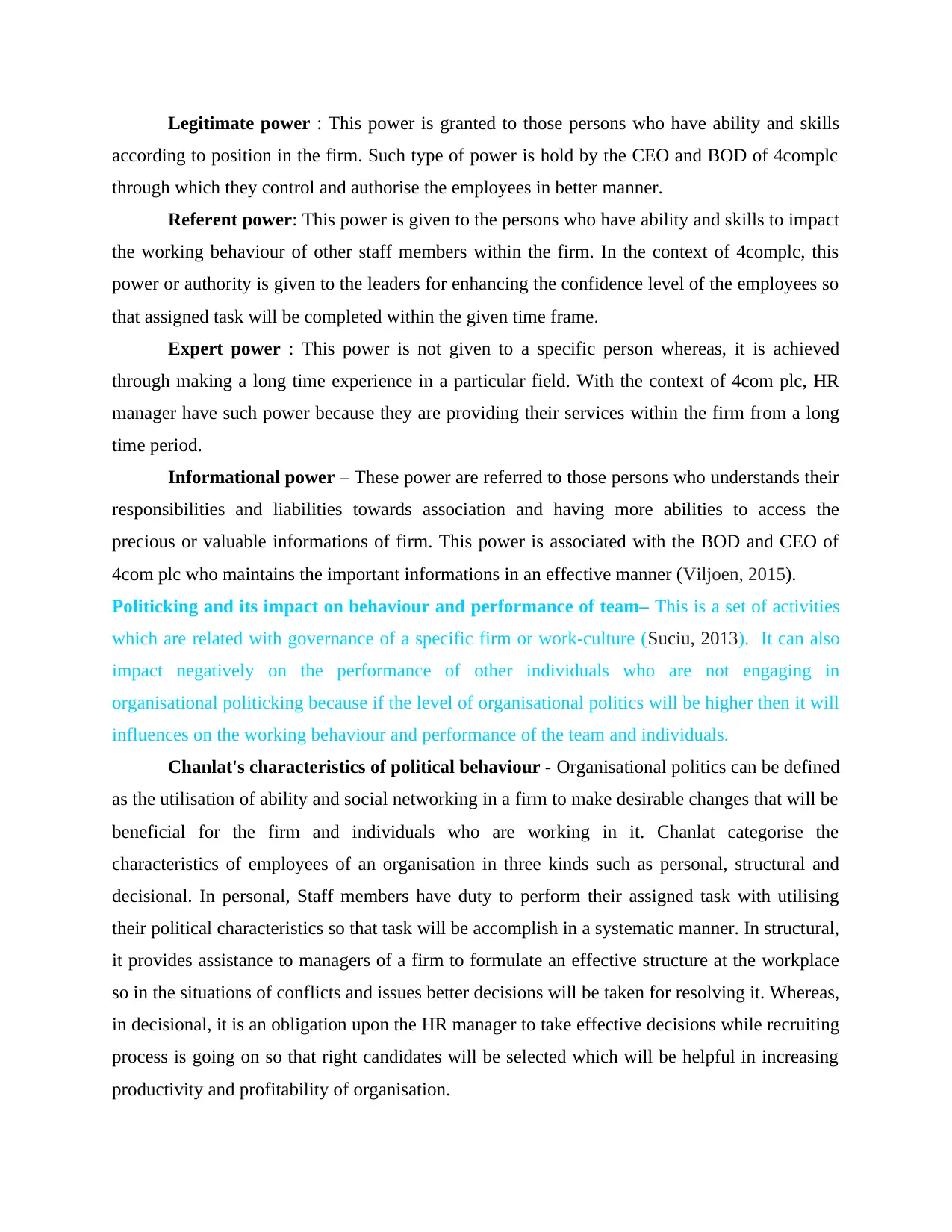
Legitimate power : This power is granted to those persons who have ability and skills
according to position in the firm. Such type of power is hold by the CEO and BOD of 4complc
through which they control and authorise the employees in better manner.
Referent power: This power is given to the persons who have ability and skills to impact
the working behaviour of other staff members within the firm. In the context of 4complc, this
power or authority is given to the leaders for enhancing the confidence level of the employees so
that assigned task will be completed within the given time frame.
Expert power : This power is not given to a specific person whereas, it is achieved
through making a long time experience in a particular field. With the context of 4com plc, HR
manager have such power because they are providing their services within the firm from a long
time period.
Informational power – These power are referred to those persons who understands their
responsibilities and liabilities towards association and having more abilities to access the
precious or valuable informations of firm. This power is associated with the BOD and CEO of
4com plc who maintains the important informations in an effective manner (Viljoen, 2015).
Politicking and its impact on behaviour and performance of team– This is a set of activities
which are related with governance of a specific firm or work-culture (Suciu, 2013). It can also
impact negatively on the performance of other individuals who are not engaging in
organisational politicking because if the level of organisational politics will be higher then it will
influences on the working behaviour and performance of the team and individuals.
Chanlat's characteristics of political behaviour - Organisational politics can be defined
as the utilisation of ability and social networking in a firm to make desirable changes that will be
beneficial for the firm and individuals who are working in it. Chanlat categorise the
characteristics of employees of an organisation in three kinds such as personal, structural and
decisional. In personal, Staff members have duty to perform their assigned task with utilising
their political characteristics so that task will be accomplish in a systematic manner. In structural,
it provides assistance to managers of a firm to formulate an effective structure at the workplace
so in the situations of conflicts and issues better decisions will be taken for resolving it. Whereas,
in decisional, it is an obligation upon the HR manager to take effective decisions while recruiting
process is going on so that right candidates will be selected which will be helpful in increasing
productivity and profitability of organisation.
according to position in the firm. Such type of power is hold by the CEO and BOD of 4complc
through which they control and authorise the employees in better manner.
Referent power: This power is given to the persons who have ability and skills to impact
the working behaviour of other staff members within the firm. In the context of 4complc, this
power or authority is given to the leaders for enhancing the confidence level of the employees so
that assigned task will be completed within the given time frame.
Expert power : This power is not given to a specific person whereas, it is achieved
through making a long time experience in a particular field. With the context of 4com plc, HR
manager have such power because they are providing their services within the firm from a long
time period.
Informational power – These power are referred to those persons who understands their
responsibilities and liabilities towards association and having more abilities to access the
precious or valuable informations of firm. This power is associated with the BOD and CEO of
4com plc who maintains the important informations in an effective manner (Viljoen, 2015).
Politicking and its impact on behaviour and performance of team– This is a set of activities
which are related with governance of a specific firm or work-culture (Suciu, 2013). It can also
impact negatively on the performance of other individuals who are not engaging in
organisational politicking because if the level of organisational politics will be higher then it will
influences on the working behaviour and performance of the team and individuals.
Chanlat's characteristics of political behaviour - Organisational politics can be defined
as the utilisation of ability and social networking in a firm to make desirable changes that will be
beneficial for the firm and individuals who are working in it. Chanlat categorise the
characteristics of employees of an organisation in three kinds such as personal, structural and
decisional. In personal, Staff members have duty to perform their assigned task with utilising
their political characteristics so that task will be accomplish in a systematic manner. In structural,
it provides assistance to managers of a firm to formulate an effective structure at the workplace
so in the situations of conflicts and issues better decisions will be taken for resolving it. Whereas,
in decisional, it is an obligation upon the HR manager to take effective decisions while recruiting
process is going on so that right candidates will be selected which will be helpful in increasing
productivity and profitability of organisation.
Paraphrase This Document
Need a fresh take? Get an instant paraphrase of this document with our AI Paraphraser
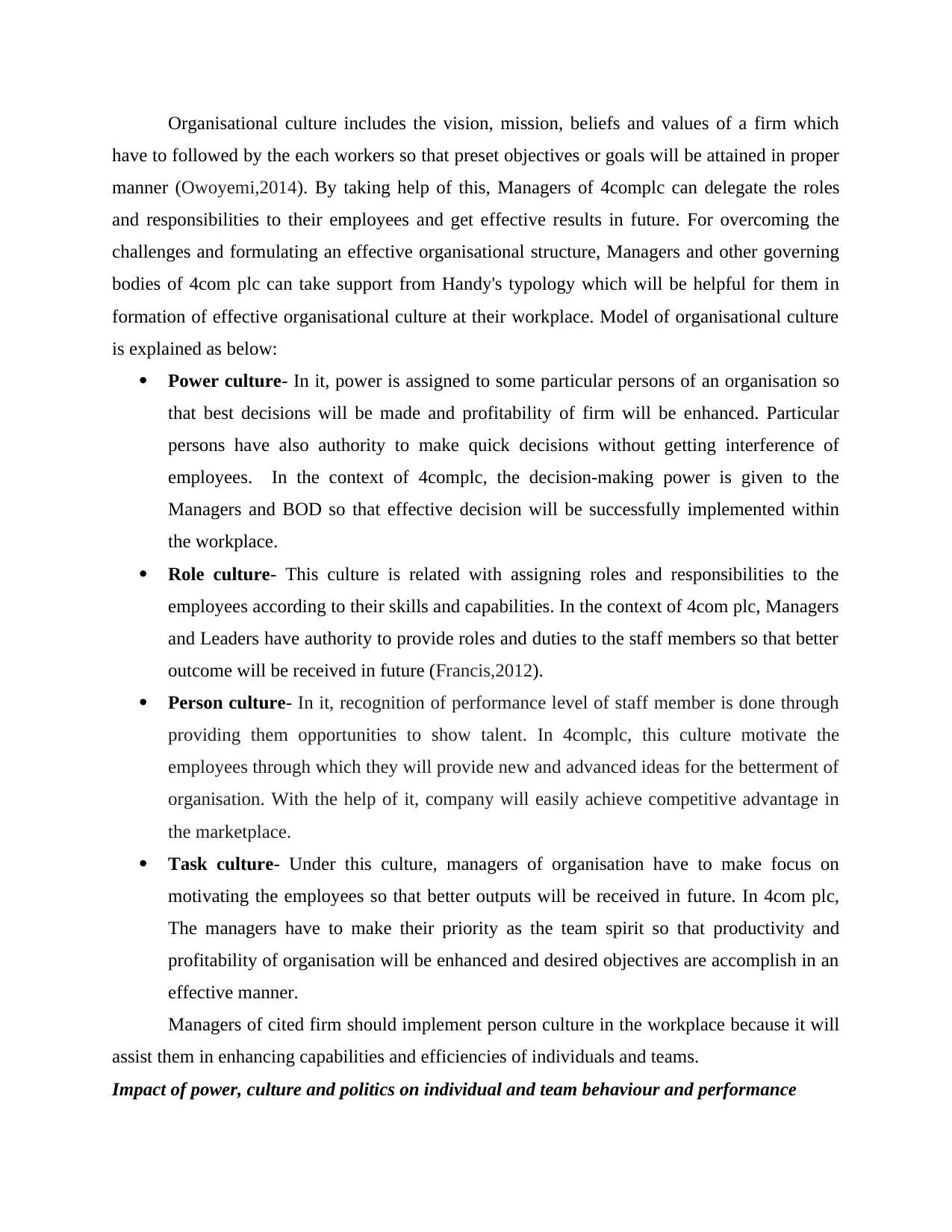
Organisational culture includes the vision, mission, beliefs and values of a firm which
have to followed by the each workers so that preset objectives or goals will be attained in proper
manner (Owoyemi,2014). By taking help of this, Managers of 4complc can delegate the roles
and responsibilities to their employees and get effective results in future. For overcoming the
challenges and formulating an effective organisational structure, Managers and other governing
bodies of 4com plc can take support from Handy's typology which will be helpful for them in
formation of effective organisational culture at their workplace. Model of organisational culture
is explained as below:
Power culture- In it, power is assigned to some particular persons of an organisation so
that best decisions will be made and profitability of firm will be enhanced. Particular
persons have also authority to make quick decisions without getting interference of
employees. In the context of 4complc, the decision-making power is given to the
Managers and BOD so that effective decision will be successfully implemented within
the workplace.
Role culture- This culture is related with assigning roles and responsibilities to the
employees according to their skills and capabilities. In the context of 4com plc, Managers
and Leaders have authority to provide roles and duties to the staff members so that better
outcome will be received in future (Francis,2012).
Person culture- In it, recognition of performance level of staff member is done through
providing them opportunities to show talent. In 4complc, this culture motivate the
employees through which they will provide new and advanced ideas for the betterment of
organisation. With the help of it, company will easily achieve competitive advantage in
the marketplace.
Task culture- Under this culture, managers of organisation have to make focus on
motivating the employees so that better outputs will be received in future. In 4com plc,
The managers have to make their priority as the team spirit so that productivity and
profitability of organisation will be enhanced and desired objectives are accomplish in an
effective manner.
Managers of cited firm should implement person culture in the workplace because it will
assist them in enhancing capabilities and efficiencies of individuals and teams.
Impact of power, culture and politics on individual and team behaviour and performance
have to followed by the each workers so that preset objectives or goals will be attained in proper
manner (Owoyemi,2014). By taking help of this, Managers of 4complc can delegate the roles
and responsibilities to their employees and get effective results in future. For overcoming the
challenges and formulating an effective organisational structure, Managers and other governing
bodies of 4com plc can take support from Handy's typology which will be helpful for them in
formation of effective organisational culture at their workplace. Model of organisational culture
is explained as below:
Power culture- In it, power is assigned to some particular persons of an organisation so
that best decisions will be made and profitability of firm will be enhanced. Particular
persons have also authority to make quick decisions without getting interference of
employees. In the context of 4complc, the decision-making power is given to the
Managers and BOD so that effective decision will be successfully implemented within
the workplace.
Role culture- This culture is related with assigning roles and responsibilities to the
employees according to their skills and capabilities. In the context of 4com plc, Managers
and Leaders have authority to provide roles and duties to the staff members so that better
outcome will be received in future (Francis,2012).
Person culture- In it, recognition of performance level of staff member is done through
providing them opportunities to show talent. In 4complc, this culture motivate the
employees through which they will provide new and advanced ideas for the betterment of
organisation. With the help of it, company will easily achieve competitive advantage in
the marketplace.
Task culture- Under this culture, managers of organisation have to make focus on
motivating the employees so that better outputs will be received in future. In 4com plc,
The managers have to make their priority as the team spirit so that productivity and
profitability of organisation will be enhanced and desired objectives are accomplish in an
effective manner.
Managers of cited firm should implement person culture in the workplace because it will
assist them in enhancing capabilities and efficiencies of individuals and teams.
Impact of power, culture and politics on individual and team behaviour and performance
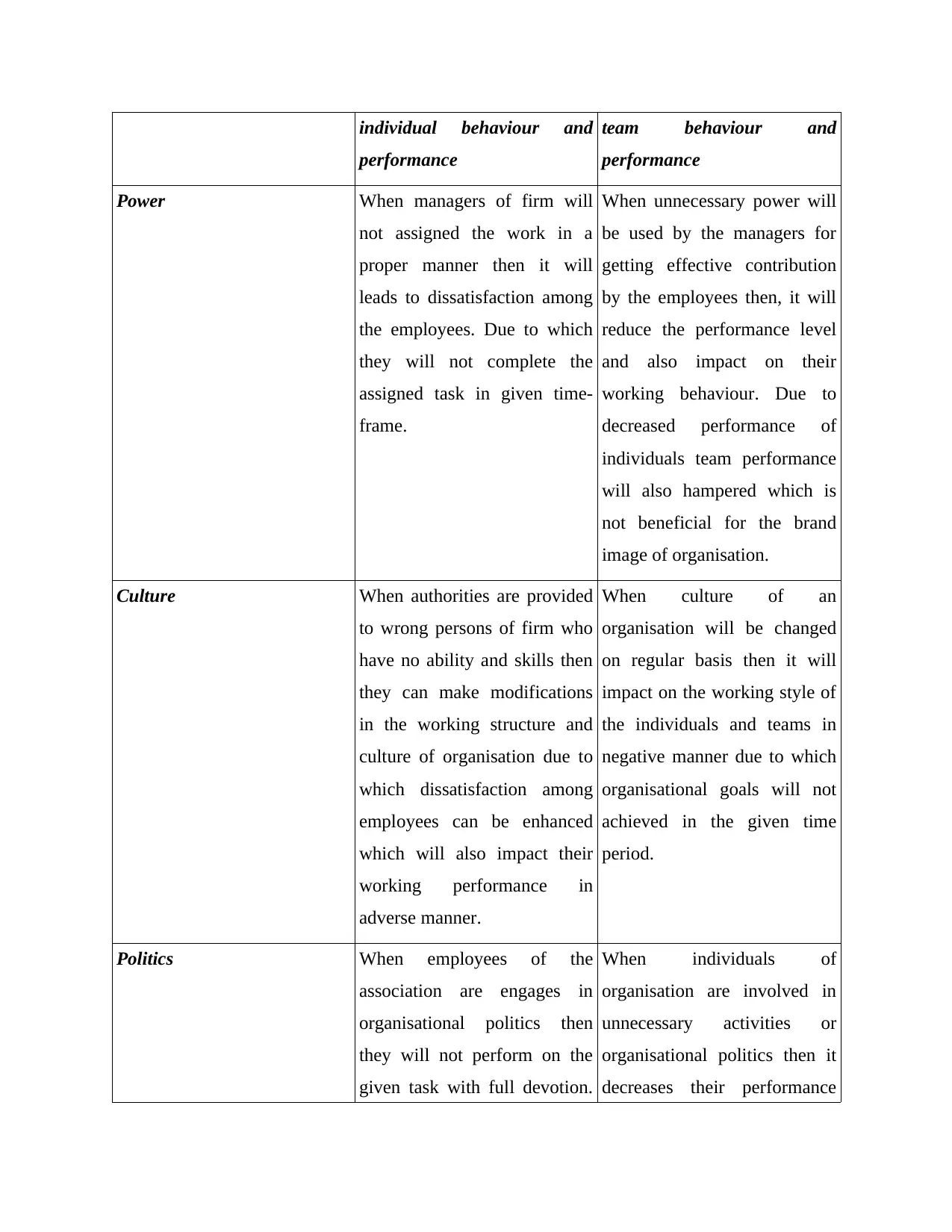
individual behaviour and
performance
team behaviour and
performance
Power When managers of firm will
not assigned the work in a
proper manner then it will
leads to dissatisfaction among
the employees. Due to which
they will not complete the
assigned task in given time-
frame.
When unnecessary power will
be used by the managers for
getting effective contribution
by the employees then, it will
reduce the performance level
and also impact on their
working behaviour. Due to
decreased performance of
individuals team performance
will also hampered which is
not beneficial for the brand
image of organisation.
Culture When authorities are provided
to wrong persons of firm who
have no ability and skills then
they can make modifications
in the working structure and
culture of organisation due to
which dissatisfaction among
employees can be enhanced
which will also impact their
working performance in
adverse manner.
When culture of an
organisation will be changed
on regular basis then it will
impact on the working style of
the individuals and teams in
negative manner due to which
organisational goals will not
achieved in the given time
period.
Politics When employees of the
association are engages in
organisational politics then
they will not perform on the
given task with full devotion.
When individuals of
organisation are involved in
unnecessary activities or
organisational politics then it
decreases their performance
performance
team behaviour and
performance
Power When managers of firm will
not assigned the work in a
proper manner then it will
leads to dissatisfaction among
the employees. Due to which
they will not complete the
assigned task in given time-
frame.
When unnecessary power will
be used by the managers for
getting effective contribution
by the employees then, it will
reduce the performance level
and also impact on their
working behaviour. Due to
decreased performance of
individuals team performance
will also hampered which is
not beneficial for the brand
image of organisation.
Culture When authorities are provided
to wrong persons of firm who
have no ability and skills then
they can make modifications
in the working structure and
culture of organisation due to
which dissatisfaction among
employees can be enhanced
which will also impact their
working performance in
adverse manner.
When culture of an
organisation will be changed
on regular basis then it will
impact on the working style of
the individuals and teams in
negative manner due to which
organisational goals will not
achieved in the given time
period.
Politics When employees of the
association are engages in
organisational politics then
they will not perform on the
given task with full devotion.
When individuals of
organisation are involved in
unnecessary activities or
organisational politics then it
decreases their performance
⊘ This is a preview!⊘
Do you want full access?
Subscribe today to unlock all pages.

Trusted by 1+ million students worldwide
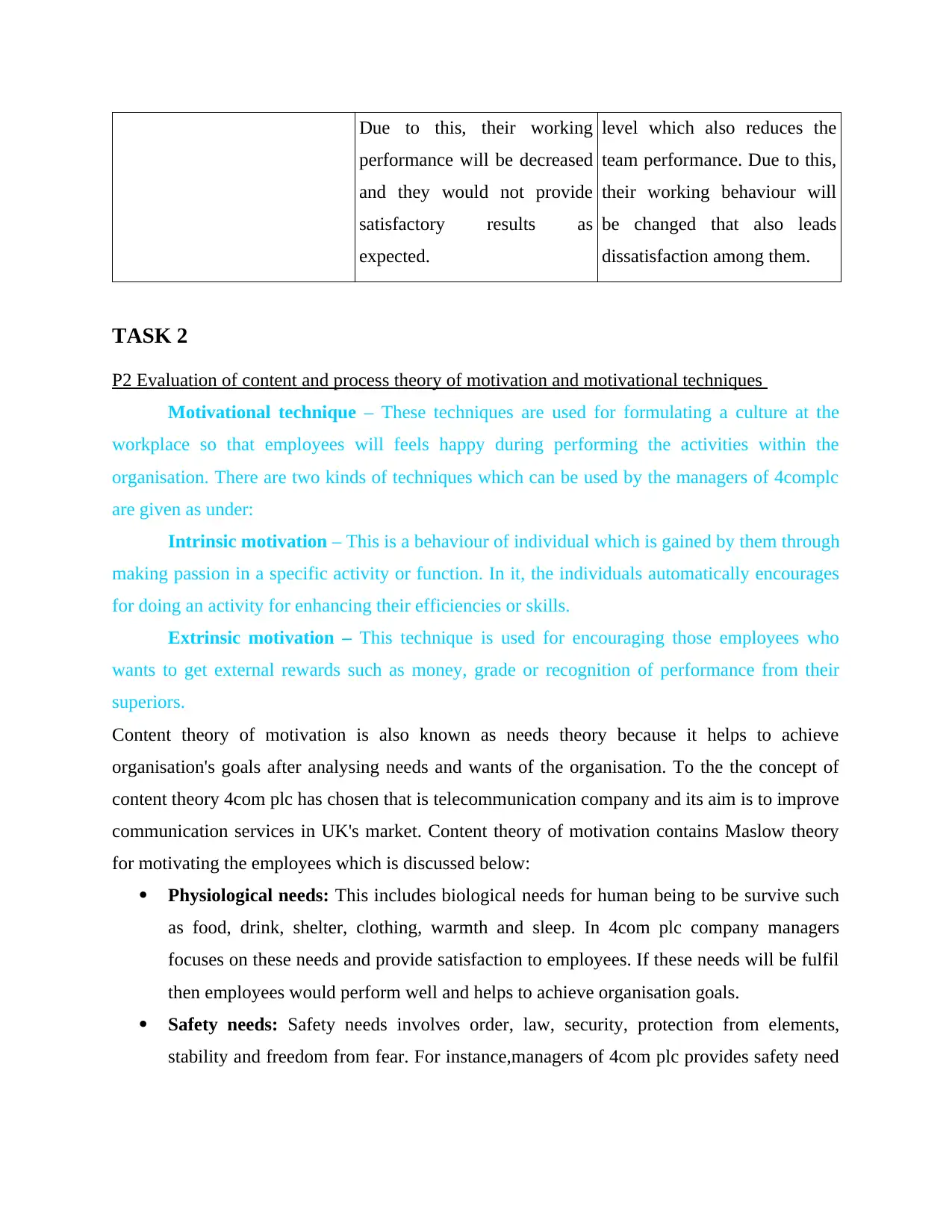
Due to this, their working
performance will be decreased
and they would not provide
satisfactory results as
expected.
level which also reduces the
team performance. Due to this,
their working behaviour will
be changed that also leads
dissatisfaction among them.
TASK 2
P2 Evaluation of content and process theory of motivation and motivational techniques
Motivational technique – These techniques are used for formulating a culture at the
workplace so that employees will feels happy during performing the activities within the
organisation. There are two kinds of techniques which can be used by the managers of 4complc
are given as under:
Intrinsic motivation – This is a behaviour of individual which is gained by them through
making passion in a specific activity or function. In it, the individuals automatically encourages
for doing an activity for enhancing their efficiencies or skills.
Extrinsic motivation – This technique is used for encouraging those employees who
wants to get external rewards such as money, grade or recognition of performance from their
superiors.
Content theory of motivation is also known as needs theory because it helps to achieve
organisation's goals after analysing needs and wants of the organisation. To the the concept of
content theory 4com plc has chosen that is telecommunication company and its aim is to improve
communication services in UK's market. Content theory of motivation contains Maslow theory
for motivating the employees which is discussed below:
Physiological needs: This includes biological needs for human being to be survive such
as food, drink, shelter, clothing, warmth and sleep. In 4com plc company managers
focuses on these needs and provide satisfaction to employees. If these needs will be fulfil
then employees would perform well and helps to achieve organisation goals.
Safety needs: Safety needs involves order, law, security, protection from elements,
stability and freedom from fear. For instance,managers of 4com plc provides safety need
performance will be decreased
and they would not provide
satisfactory results as
expected.
level which also reduces the
team performance. Due to this,
their working behaviour will
be changed that also leads
dissatisfaction among them.
TASK 2
P2 Evaluation of content and process theory of motivation and motivational techniques
Motivational technique – These techniques are used for formulating a culture at the
workplace so that employees will feels happy during performing the activities within the
organisation. There are two kinds of techniques which can be used by the managers of 4complc
are given as under:
Intrinsic motivation – This is a behaviour of individual which is gained by them through
making passion in a specific activity or function. In it, the individuals automatically encourages
for doing an activity for enhancing their efficiencies or skills.
Extrinsic motivation – This technique is used for encouraging those employees who
wants to get external rewards such as money, grade or recognition of performance from their
superiors.
Content theory of motivation is also known as needs theory because it helps to achieve
organisation's goals after analysing needs and wants of the organisation. To the the concept of
content theory 4com plc has chosen that is telecommunication company and its aim is to improve
communication services in UK's market. Content theory of motivation contains Maslow theory
for motivating the employees which is discussed below:
Physiological needs: This includes biological needs for human being to be survive such
as food, drink, shelter, clothing, warmth and sleep. In 4com plc company managers
focuses on these needs and provide satisfaction to employees. If these needs will be fulfil
then employees would perform well and helps to achieve organisation goals.
Safety needs: Safety needs involves order, law, security, protection from elements,
stability and freedom from fear. For instance,managers of 4com plc provides safety need
Paraphrase This Document
Need a fresh take? Get an instant paraphrase of this document with our AI Paraphraser
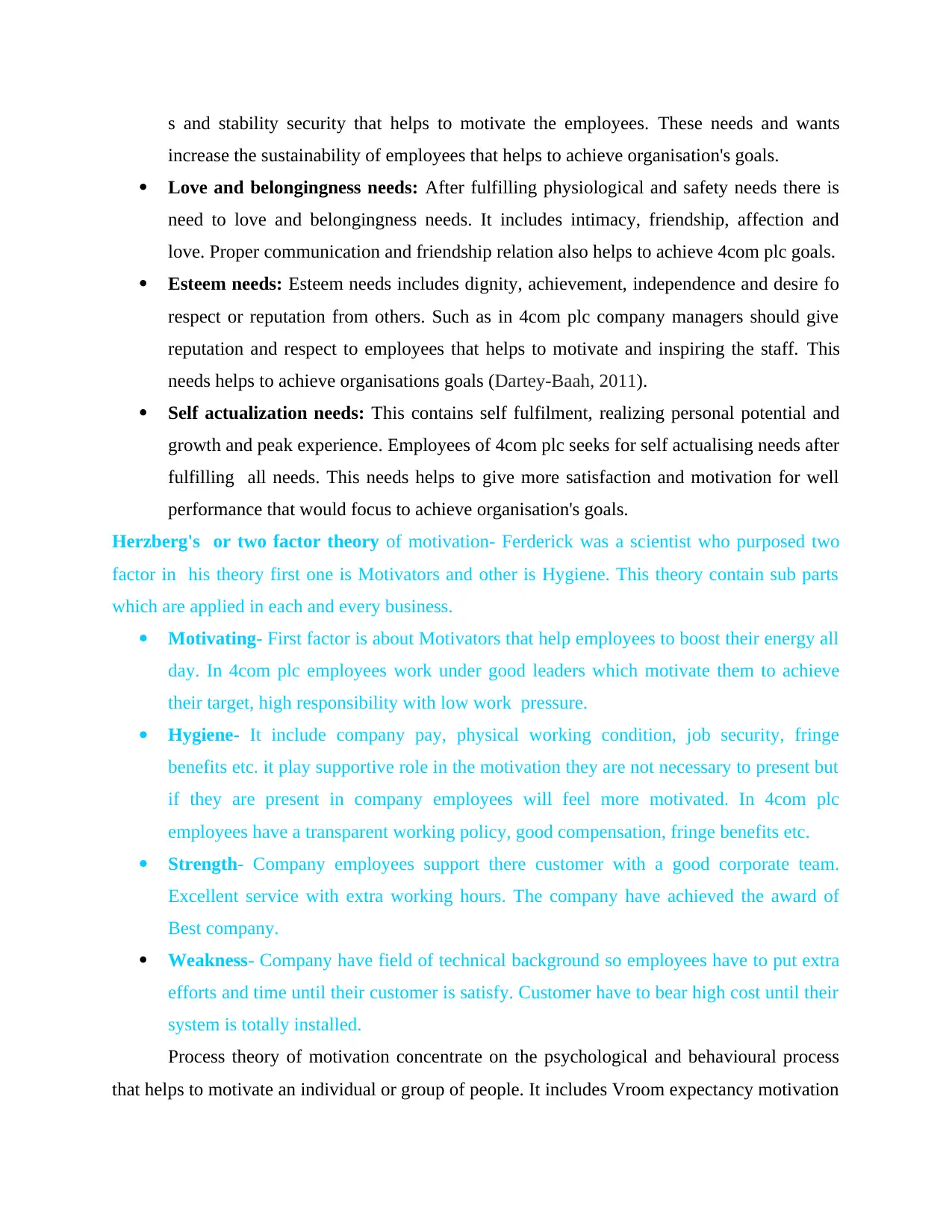
s and stability security that helps to motivate the employees. These needs and wants
increase the sustainability of employees that helps to achieve organisation's goals.
Love and belongingness needs: After fulfilling physiological and safety needs there is
need to love and belongingness needs. It includes intimacy, friendship, affection and
love. Proper communication and friendship relation also helps to achieve 4com plc goals.
Esteem needs: Esteem needs includes dignity, achievement, independence and desire fo
respect or reputation from others. Such as in 4com plc company managers should give
reputation and respect to employees that helps to motivate and inspiring the staff. This
needs helps to achieve organisations goals (Dartey-Baah, 2011).
Self actualization needs: This contains self fulfilment, realizing personal potential and
growth and peak experience. Employees of 4com plc seeks for self actualising needs after
fulfilling all needs. This needs helps to give more satisfaction and motivation for well
performance that would focus to achieve organisation's goals.
Herzberg's or two factor theory of motivation- Ferderick was a scientist who purposed two
factor in his theory first one is Motivators and other is Hygiene. This theory contain sub parts
which are applied in each and every business.
Motivating- First factor is about Motivators that help employees to boost their energy all
day. In 4com plc employees work under good leaders which motivate them to achieve
their target, high responsibility with low work pressure.
Hygiene- It include company pay, physical working condition, job security, fringe
benefits etc. it play supportive role in the motivation they are not necessary to present but
if they are present in company employees will feel more motivated. In 4com plc
employees have a transparent working policy, good compensation, fringe benefits etc.
Strength- Company employees support there customer with a good corporate team.
Excellent service with extra working hours. The company have achieved the award of
Best company.
Weakness- Company have field of technical background so employees have to put extra
efforts and time until their customer is satisfy. Customer have to bear high cost until their
system is totally installed.
Process theory of motivation concentrate on the psychological and behavioural process
that helps to motivate an individual or group of people. It includes Vroom expectancy motivation
increase the sustainability of employees that helps to achieve organisation's goals.
Love and belongingness needs: After fulfilling physiological and safety needs there is
need to love and belongingness needs. It includes intimacy, friendship, affection and
love. Proper communication and friendship relation also helps to achieve 4com plc goals.
Esteem needs: Esteem needs includes dignity, achievement, independence and desire fo
respect or reputation from others. Such as in 4com plc company managers should give
reputation and respect to employees that helps to motivate and inspiring the staff. This
needs helps to achieve organisations goals (Dartey-Baah, 2011).
Self actualization needs: This contains self fulfilment, realizing personal potential and
growth and peak experience. Employees of 4com plc seeks for self actualising needs after
fulfilling all needs. This needs helps to give more satisfaction and motivation for well
performance that would focus to achieve organisation's goals.
Herzberg's or two factor theory of motivation- Ferderick was a scientist who purposed two
factor in his theory first one is Motivators and other is Hygiene. This theory contain sub parts
which are applied in each and every business.
Motivating- First factor is about Motivators that help employees to boost their energy all
day. In 4com plc employees work under good leaders which motivate them to achieve
their target, high responsibility with low work pressure.
Hygiene- It include company pay, physical working condition, job security, fringe
benefits etc. it play supportive role in the motivation they are not necessary to present but
if they are present in company employees will feel more motivated. In 4com plc
employees have a transparent working policy, good compensation, fringe benefits etc.
Strength- Company employees support there customer with a good corporate team.
Excellent service with extra working hours. The company have achieved the award of
Best company.
Weakness- Company have field of technical background so employees have to put extra
efforts and time until their customer is satisfy. Customer have to bear high cost until their
system is totally installed.
Process theory of motivation concentrate on the psychological and behavioural process
that helps to motivate an individual or group of people. It includes Vroom expectancy motivation
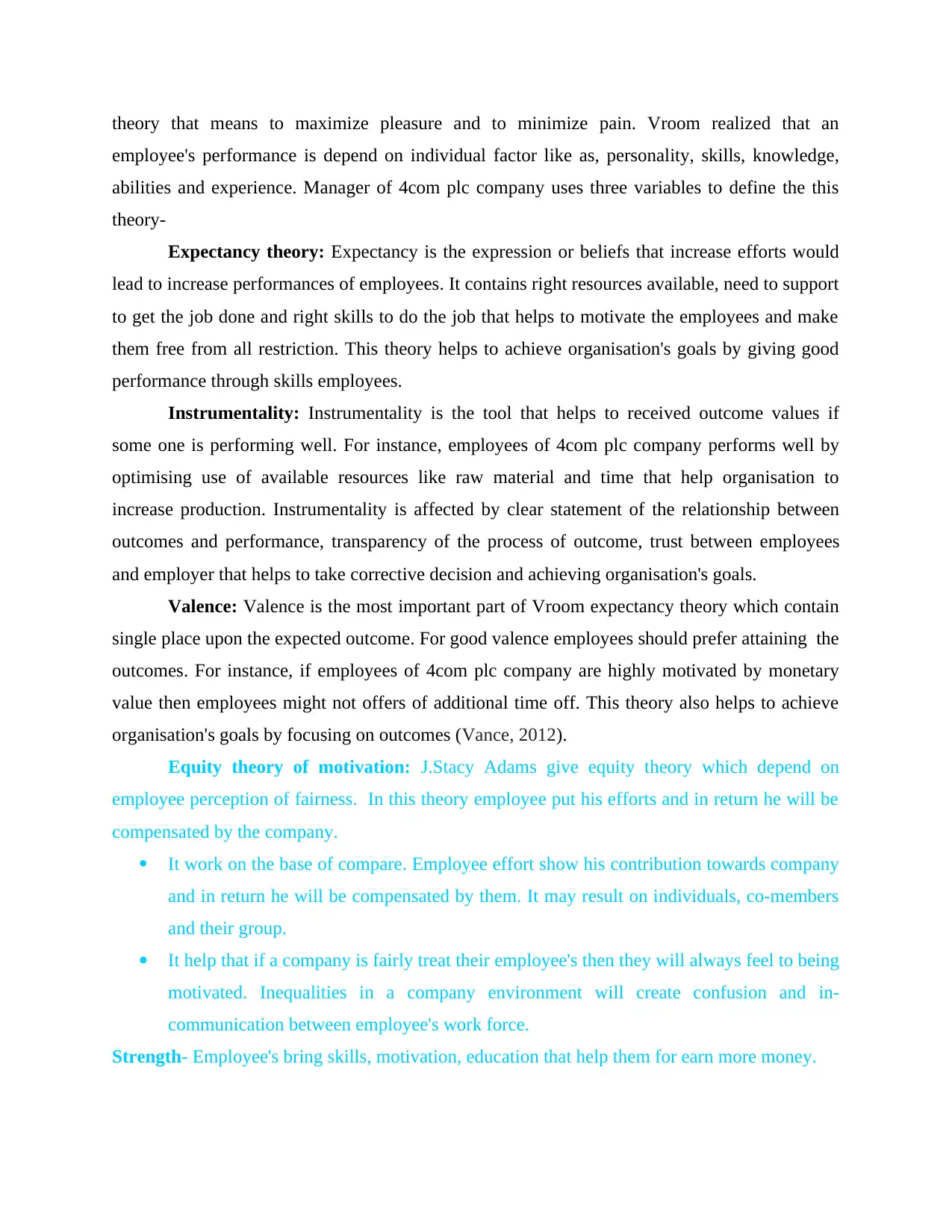
theory that means to maximize pleasure and to minimize pain. Vroom realized that an
employee's performance is depend on individual factor like as, personality, skills, knowledge,
abilities and experience. Manager of 4com plc company uses three variables to define the this
theory-
Expectancy theory: Expectancy is the expression or beliefs that increase efforts would
lead to increase performances of employees. It contains right resources available, need to support
to get the job done and right skills to do the job that helps to motivate the employees and make
them free from all restriction. This theory helps to achieve organisation's goals by giving good
performance through skills employees.
Instrumentality: Instrumentality is the tool that helps to received outcome values if
some one is performing well. For instance, employees of 4com plc company performs well by
optimising use of available resources like raw material and time that help organisation to
increase production. Instrumentality is affected by clear statement of the relationship between
outcomes and performance, transparency of the process of outcome, trust between employees
and employer that helps to take corrective decision and achieving organisation's goals.
Valence: Valence is the most important part of Vroom expectancy theory which contain
single place upon the expected outcome. For good valence employees should prefer attaining the
outcomes. For instance, if employees of 4com plc company are highly motivated by monetary
value then employees might not offers of additional time off. This theory also helps to achieve
organisation's goals by focusing on outcomes (Vance, 2012).
Equity theory of motivation: J.Stacy Adams give equity theory which depend on
employee perception of fairness. In this theory employee put his efforts and in return he will be
compensated by the company.
It work on the base of compare. Employee effort show his contribution towards company
and in return he will be compensated by them. It may result on individuals, co-members
and their group.
It help that if a company is fairly treat their employee's then they will always feel to being
motivated. Inequalities in a company environment will create confusion and in-
communication between employee's work force.
Strength- Employee's bring skills, motivation, education that help them for earn more money.
employee's performance is depend on individual factor like as, personality, skills, knowledge,
abilities and experience. Manager of 4com plc company uses three variables to define the this
theory-
Expectancy theory: Expectancy is the expression or beliefs that increase efforts would
lead to increase performances of employees. It contains right resources available, need to support
to get the job done and right skills to do the job that helps to motivate the employees and make
them free from all restriction. This theory helps to achieve organisation's goals by giving good
performance through skills employees.
Instrumentality: Instrumentality is the tool that helps to received outcome values if
some one is performing well. For instance, employees of 4com plc company performs well by
optimising use of available resources like raw material and time that help organisation to
increase production. Instrumentality is affected by clear statement of the relationship between
outcomes and performance, transparency of the process of outcome, trust between employees
and employer that helps to take corrective decision and achieving organisation's goals.
Valence: Valence is the most important part of Vroom expectancy theory which contain
single place upon the expected outcome. For good valence employees should prefer attaining the
outcomes. For instance, if employees of 4com plc company are highly motivated by monetary
value then employees might not offers of additional time off. This theory also helps to achieve
organisation's goals by focusing on outcomes (Vance, 2012).
Equity theory of motivation: J.Stacy Adams give equity theory which depend on
employee perception of fairness. In this theory employee put his efforts and in return he will be
compensated by the company.
It work on the base of compare. Employee effort show his contribution towards company
and in return he will be compensated by them. It may result on individuals, co-members
and their group.
It help that if a company is fairly treat their employee's then they will always feel to being
motivated. Inequalities in a company environment will create confusion and in-
communication between employee's work force.
Strength- Employee's bring skills, motivation, education that help them for earn more money.
⊘ This is a preview!⊘
Do you want full access?
Subscribe today to unlock all pages.

Trusted by 1+ million students worldwide
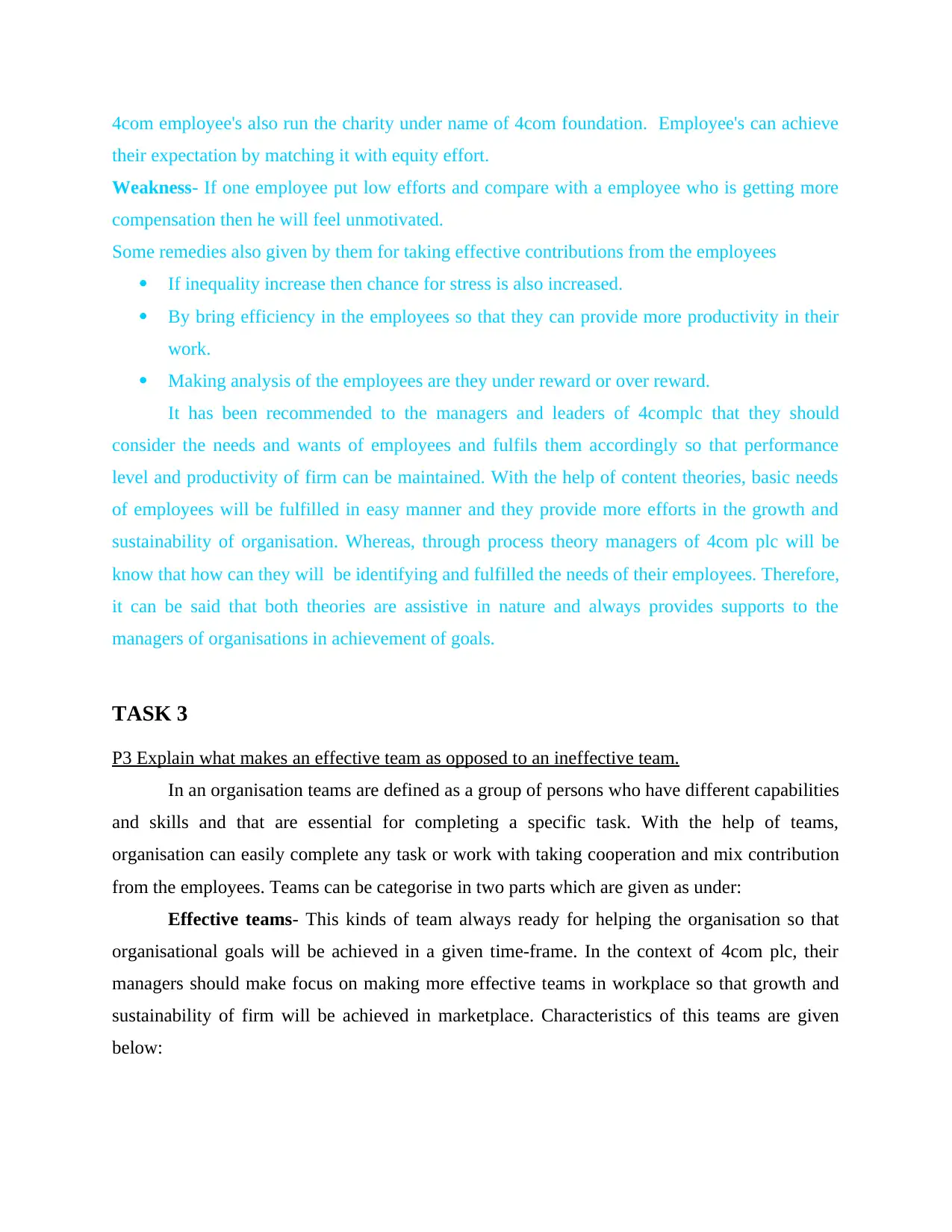
4com employee's also run the charity under name of 4com foundation. Employee's can achieve
their expectation by matching it with equity effort.
Weakness- If one employee put low efforts and compare with a employee who is getting more
compensation then he will feel unmotivated.
Some remedies also given by them for taking effective contributions from the employees
If inequality increase then chance for stress is also increased.
By bring efficiency in the employees so that they can provide more productivity in their
work.
Making analysis of the employees are they under reward or over reward.
It has been recommended to the managers and leaders of 4complc that they should
consider the needs and wants of employees and fulfils them accordingly so that performance
level and productivity of firm can be maintained. With the help of content theories, basic needs
of employees will be fulfilled in easy manner and they provide more efforts in the growth and
sustainability of organisation. Whereas, through process theory managers of 4com plc will be
know that how can they will be identifying and fulfilled the needs of their employees. Therefore,
it can be said that both theories are assistive in nature and always provides supports to the
managers of organisations in achievement of goals.
TASK 3
P3 Explain what makes an effective team as opposed to an ineffective team.
In an organisation teams are defined as a group of persons who have different capabilities
and skills and that are essential for completing a specific task. With the help of teams,
organisation can easily complete any task or work with taking cooperation and mix contribution
from the employees. Teams can be categorise in two parts which are given as under:
Effective teams- This kinds of team always ready for helping the organisation so that
organisational goals will be achieved in a given time-frame. In the context of 4com plc, their
managers should make focus on making more effective teams in workplace so that growth and
sustainability of firm will be achieved in marketplace. Characteristics of this teams are given
below:
their expectation by matching it with equity effort.
Weakness- If one employee put low efforts and compare with a employee who is getting more
compensation then he will feel unmotivated.
Some remedies also given by them for taking effective contributions from the employees
If inequality increase then chance for stress is also increased.
By bring efficiency in the employees so that they can provide more productivity in their
work.
Making analysis of the employees are they under reward or over reward.
It has been recommended to the managers and leaders of 4complc that they should
consider the needs and wants of employees and fulfils them accordingly so that performance
level and productivity of firm can be maintained. With the help of content theories, basic needs
of employees will be fulfilled in easy manner and they provide more efforts in the growth and
sustainability of organisation. Whereas, through process theory managers of 4com plc will be
know that how can they will be identifying and fulfilled the needs of their employees. Therefore,
it can be said that both theories are assistive in nature and always provides supports to the
managers of organisations in achievement of goals.
TASK 3
P3 Explain what makes an effective team as opposed to an ineffective team.
In an organisation teams are defined as a group of persons who have different capabilities
and skills and that are essential for completing a specific task. With the help of teams,
organisation can easily complete any task or work with taking cooperation and mix contribution
from the employees. Teams can be categorise in two parts which are given as under:
Effective teams- This kinds of team always ready for helping the organisation so that
organisational goals will be achieved in a given time-frame. In the context of 4com plc, their
managers should make focus on making more effective teams in workplace so that growth and
sustainability of firm will be achieved in marketplace. Characteristics of this teams are given
below:
Paraphrase This Document
Need a fresh take? Get an instant paraphrase of this document with our AI Paraphraser
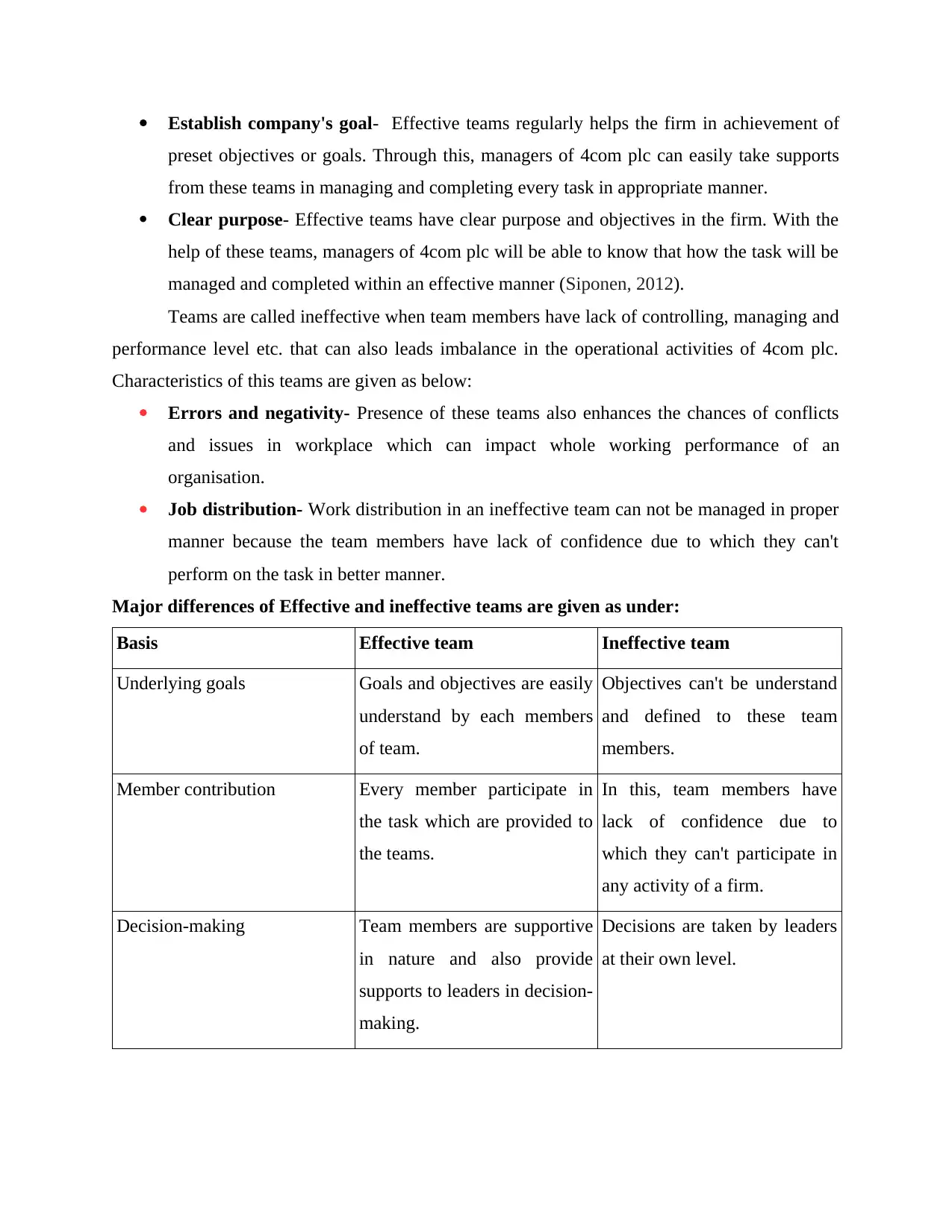
Establish company's goal- Effective teams regularly helps the firm in achievement of
preset objectives or goals. Through this, managers of 4com plc can easily take supports
from these teams in managing and completing every task in appropriate manner.
Clear purpose- Effective teams have clear purpose and objectives in the firm. With the
help of these teams, managers of 4com plc will be able to know that how the task will be
managed and completed within an effective manner (Siponen, 2012).
Teams are called ineffective when team members have lack of controlling, managing and
performance level etc. that can also leads imbalance in the operational activities of 4com plc.
Characteristics of this teams are given as below:
Errors and negativity- Presence of these teams also enhances the chances of conflicts
and issues in workplace which can impact whole working performance of an
organisation.
Job distribution- Work distribution in an ineffective team can not be managed in proper
manner because the team members have lack of confidence due to which they can't
perform on the task in better manner.
Major differences of Effective and ineffective teams are given as under:
Basis Effective team Ineffective team
Underlying goals Goals and objectives are easily
understand by each members
of team.
Objectives can't be understand
and defined to these team
members.
Member contribution Every member participate in
the task which are provided to
the teams.
In this, team members have
lack of confidence due to
which they can't participate in
any activity of a firm.
Decision-making Team members are supportive
in nature and also provide
supports to leaders in decision-
making.
Decisions are taken by leaders
at their own level.
preset objectives or goals. Through this, managers of 4com plc can easily take supports
from these teams in managing and completing every task in appropriate manner.
Clear purpose- Effective teams have clear purpose and objectives in the firm. With the
help of these teams, managers of 4com plc will be able to know that how the task will be
managed and completed within an effective manner (Siponen, 2012).
Teams are called ineffective when team members have lack of controlling, managing and
performance level etc. that can also leads imbalance in the operational activities of 4com plc.
Characteristics of this teams are given as below:
Errors and negativity- Presence of these teams also enhances the chances of conflicts
and issues in workplace which can impact whole working performance of an
organisation.
Job distribution- Work distribution in an ineffective team can not be managed in proper
manner because the team members have lack of confidence due to which they can't
perform on the task in better manner.
Major differences of Effective and ineffective teams are given as under:
Basis Effective team Ineffective team
Underlying goals Goals and objectives are easily
understand by each members
of team.
Objectives can't be understand
and defined to these team
members.
Member contribution Every member participate in
the task which are provided to
the teams.
In this, team members have
lack of confidence due to
which they can't participate in
any activity of a firm.
Decision-making Team members are supportive
in nature and also provide
supports to leaders in decision-
making.
Decisions are taken by leaders
at their own level.
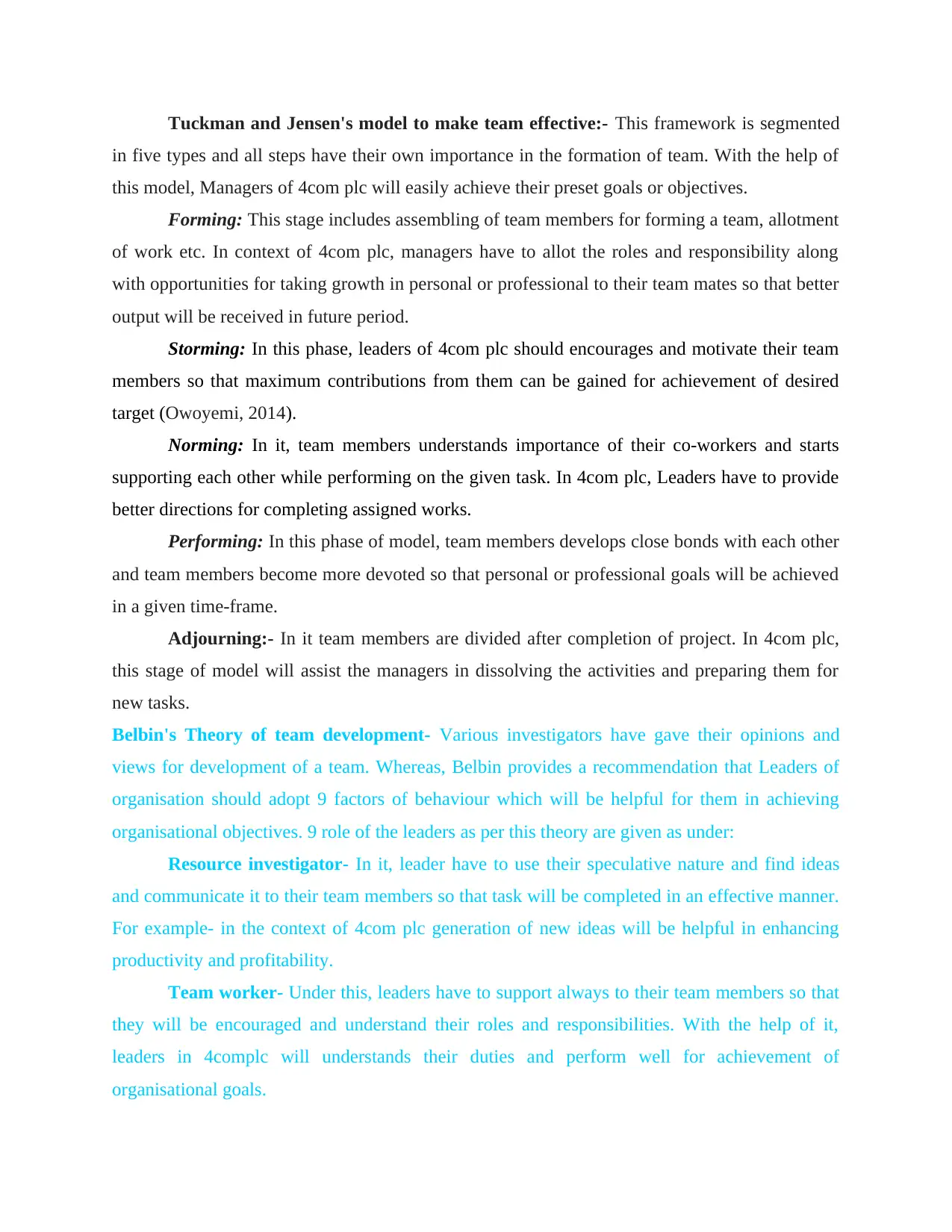
Tuckman and Jensen's model to make team effective:- This framework is segmented
in five types and all steps have their own importance in the formation of team. With the help of
this model, Managers of 4com plc will easily achieve their preset goals or objectives.
Forming: This stage includes assembling of team members for forming a team, allotment
of work etc. In context of 4com plc, managers have to allot the roles and responsibility along
with opportunities for taking growth in personal or professional to their team mates so that better
output will be received in future period.
Storming: In this phase, leaders of 4com plc should encourages and motivate their team
members so that maximum contributions from them can be gained for achievement of desired
target (Owoyemi, 2014).
Norming: In it, team members understands importance of their co-workers and starts
supporting each other while performing on the given task. In 4com plc, Leaders have to provide
better directions for completing assigned works.
Performing: In this phase of model, team members develops close bonds with each other
and team members become more devoted so that personal or professional goals will be achieved
in a given time-frame.
Adjourning:- In it team members are divided after completion of project. In 4com plc,
this stage of model will assist the managers in dissolving the activities and preparing them for
new tasks.
Belbin's Theory of team development- Various investigators have gave their opinions and
views for development of a team. Whereas, Belbin provides a recommendation that Leaders of
organisation should adopt 9 factors of behaviour which will be helpful for them in achieving
organisational objectives. 9 role of the leaders as per this theory are given as under:
Resource investigator- In it, leader have to use their speculative nature and find ideas
and communicate it to their team members so that task will be completed in an effective manner.
For example- in the context of 4com plc generation of new ideas will be helpful in enhancing
productivity and profitability.
Team worker- Under this, leaders have to support always to their team members so that
they will be encouraged and understand their roles and responsibilities. With the help of it,
leaders in 4complc will understands their duties and perform well for achievement of
organisational goals.
in five types and all steps have their own importance in the formation of team. With the help of
this model, Managers of 4com plc will easily achieve their preset goals or objectives.
Forming: This stage includes assembling of team members for forming a team, allotment
of work etc. In context of 4com plc, managers have to allot the roles and responsibility along
with opportunities for taking growth in personal or professional to their team mates so that better
output will be received in future period.
Storming: In this phase, leaders of 4com plc should encourages and motivate their team
members so that maximum contributions from them can be gained for achievement of desired
target (Owoyemi, 2014).
Norming: In it, team members understands importance of their co-workers and starts
supporting each other while performing on the given task. In 4com plc, Leaders have to provide
better directions for completing assigned works.
Performing: In this phase of model, team members develops close bonds with each other
and team members become more devoted so that personal or professional goals will be achieved
in a given time-frame.
Adjourning:- In it team members are divided after completion of project. In 4com plc,
this stage of model will assist the managers in dissolving the activities and preparing them for
new tasks.
Belbin's Theory of team development- Various investigators have gave their opinions and
views for development of a team. Whereas, Belbin provides a recommendation that Leaders of
organisation should adopt 9 factors of behaviour which will be helpful for them in achieving
organisational objectives. 9 role of the leaders as per this theory are given as under:
Resource investigator- In it, leader have to use their speculative nature and find ideas
and communicate it to their team members so that task will be completed in an effective manner.
For example- in the context of 4com plc generation of new ideas will be helpful in enhancing
productivity and profitability.
Team worker- Under this, leaders have to support always to their team members so that
they will be encouraged and understand their roles and responsibilities. With the help of it,
leaders in 4complc will understands their duties and perform well for achievement of
organisational goals.
⊘ This is a preview!⊘
Do you want full access?
Subscribe today to unlock all pages.

Trusted by 1+ million students worldwide
1 out of 16
Related Documents
Your All-in-One AI-Powered Toolkit for Academic Success.
+13062052269
info@desklib.com
Available 24*7 on WhatsApp / Email
![[object Object]](/_next/static/media/star-bottom.7253800d.svg)
Unlock your academic potential
Copyright © 2020–2026 A2Z Services. All Rights Reserved. Developed and managed by ZUCOL.





